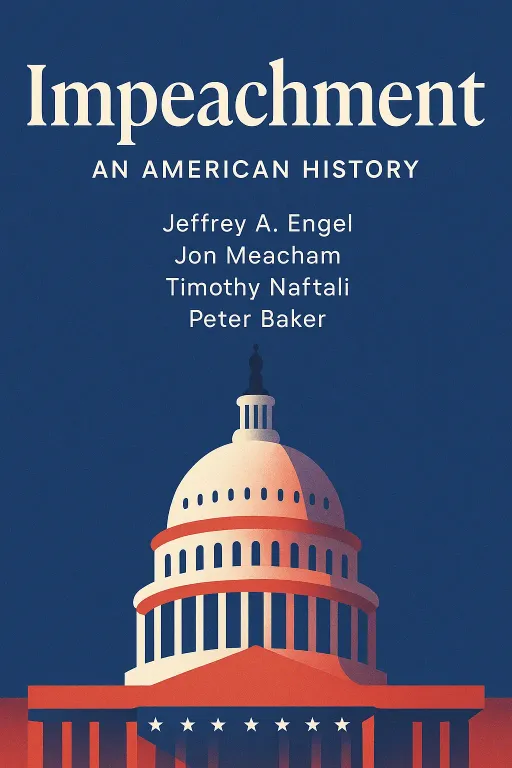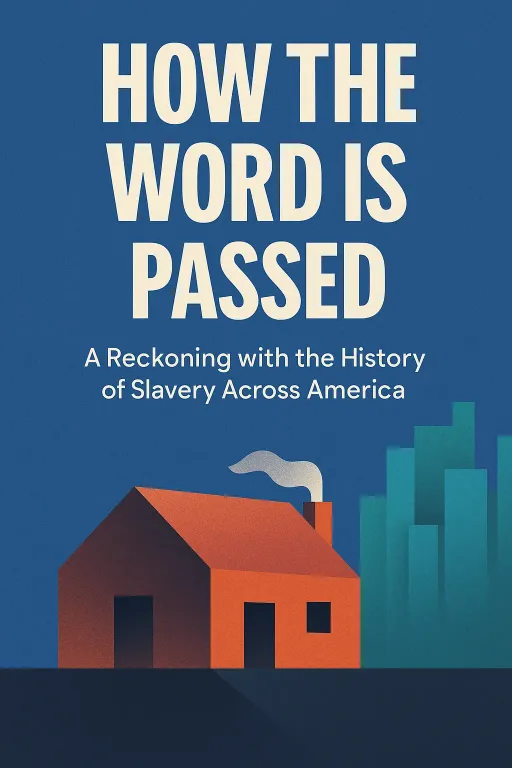
Impeachment
10 minAn American History
Introduction
Narrator: On a Saturday night in October 1973, the American system of government faced a constitutional crisis. President Richard Nixon, desperate to stop an investigation into the Watergate scandal, ordered his Attorney General, Elliot Richardson, to fire the special prosecutor, Archibald Cox. Richardson refused and resigned in protest. Nixon then ordered the Deputy Attorney General, William Ruckelshaus, to do the same. He also refused and resigned. Finally, the third in line, Solicitor General Robert Bork, complied. This "Saturday Night Massacre" was a raw and public abuse of executive power, an act so brazen it awakened a constitutional power that had lain dormant for over a century: presidential impeachment. How did the nation arrive at this precipice? And what does the history of this ultimate political weapon tell us about the nature of power, justice, and the very stability of the republic? The book Impeachment: An American History by Jeffrey A. Engel, Jon Meacham, Timothy Naftali, and Peter Baker provides a critical analysis of this formidable tool, exploring its origins and its dramatic use against three presidents.
The Founders Forged Impeachment as a Guardrail Against Tyranny
Key Insight 1
Narrator: The framers of the Constitution were haunted by the ghost of a king. Fresh from a revolution against monarchy, they were deeply suspicious of concentrated executive power. As Benjamin Franklin warned, there is a natural tendency for rulers to exploit their subjects, and the new American president could be no exception. Their first attempt at a government, the Articles of Confederation, had proven disastrously weak. It couldn't raise money, maintain order, or conduct foreign policy effectively. An event known as Shays' Rebellion, where indebted farmers in Massachusetts shut down courthouses, exposed the federal government's impotence and created an urgent push for a stronger national framework.
At the 1_787 Constitutional Convention, the challenge was to create a president powerful enough to lead but not so powerful as to become a despot. The solution was a system of checks and balances, and impeachment was its ultimate fail-safe. George Mason of Virginia asked the defining question: "Shall any man be above justice?" The answer was a resounding no. The framers designed impeachment not as a tool for policy disagreements, but as a remedy for fundamental abuses of power that threatened the republic itself. They defined the grounds as "Treason, Bribery, or other high Crimes and Misdemeanors." As Alexander Hamilton later clarified, this was not about petty crimes. It concerned offenses of a "political" nature—those that inflicted "injuries done immediately to the society itself," such as betraying the public trust or being corrupted by foreign powers.
The Johnson Case Revealed Impeachment as a Political Weapon
Key Insight 2
Narrator: The first real test of the impeachment clause came a century later, in the bitter aftermath of the Civil War. When Abraham Lincoln was assassinated, his vice president, Andrew Johnson, ascended to the presidency. Republicans in Congress initially hoped Johnson, a Southerner who had remained loyal to the Union, would support their vision for Reconstruction. They were quickly and brutally disappointed. Johnson, a staunch white supremacist, believed that "white men alone must manage the South." He vetoed civil rights legislation and used his power to obstruct congressional efforts to protect newly freed slaves.
The conflict became a full-blown political war. The Republican-controlled Congress, holding a massive majority, passed the Tenure of Office Act, a law of questionable constitutionality designed to prevent the president from firing cabinet members without Senate approval. It was a trap, and Johnson walked right into it by dismissing his Secretary of War, Edwin Stanton. This gave Republicans the pretext they needed. The House of Representatives voted to impeach Johnson, not for a crime that endangered the nation, but for a political battle he was losing. The trial in the Senate was a spectacle of high politics and backroom dealing. In the end, Johnson was acquitted by a single vote. Seven Republican senators broke with their party, fearing that removing a president over policy disputes would permanently cripple the executive branch and establish congressional supremacy. The Johnson case set a powerful precedent: impeachment is as much a political process as a legal one, and it can be wielded as a weapon in times of intense partisan conflict.
The Nixon Case Proved No President Is Above the Law When Evidence Is Irrefutable
Key Insight 3
Narrator: If Johnson’s impeachment was about political warfare, Richard Nixon’s was about clear-cut criminality. The scandal began with a "third-rate burglary" at the Democratic National Committee headquarters in the Watergate Hotel. But the true impeachable offense was not the break-in itself; it was the president’s personal direction of a criminal conspiracy to cover it up. From the very beginning, Nixon used the power of his office to obstruct justice, ordering the CIA to lie to the FBI to halt the investigation and authorizing hush money payments to the burglars.
For two years, Nixon maintained his innocence, but his web of lies unraveled under the pressure of investigative journalism, a determined special prosecutor, and congressional inquiry. The turning point came with a stunning revelation: a secret, sound-activated taping system had recorded nearly all of the president's conversations. The tapes held the truth. After the "Saturday Night Massacre" sparked public outrage, the House Judiciary Committee began a formal impeachment inquiry. Crucially, the committee's chairman, Peter Rodino, and its lead counsel, John Doar, insisted on a nonpartisan, evidence-based process. When the Supreme Court unanimously ordered Nixon to turn over the tapes, his presidency was doomed. The "smoking gun" tape from June 23, 1972, captured Nixon explicitly ordering a cover-up just days after the break-in. With this irrefutable evidence, his support collapsed. Facing certain impeachment by the House and conviction in the Senate, Richard Nixon resigned, proving that when a president's crimes are undeniable, even the highest office in the land cannot shield him from accountability.
The Clinton Case Blurred the Lines Between Personal Sin and Public Crime
Key Insight 4
Narrator: The impeachment of Bill Clinton introduced a new, more complex dynamic. The crisis did not stem from a war over the nation's soul or a criminal conspiracy against the state, but from the president's attempts to cover up a sordid affair with a White House intern, Monica Lewinsky. When questioned under oath in a separate sexual harassment lawsuit, Clinton lied about the relationship. This act of perjury, combined with efforts to conceal the affair, formed the basis for the impeachment articles of perjury and obstruction of justice.
From the outset, the Clinton impeachment was a deeply partisan affair, what one Republican leader openly called "The Campaign." It was also the first major scandal of the 24-hour cable news and internet era, which amplified every salacious detail. The release of the Starr Report, with its graphic descriptions of the president's sexual encounters, backfired on Republicans, as many Americans saw it as a gratuitous and partisan attack. Unlike in the Nixon case, the public drew a sharp distinction between Clinton's personal failings and his performance as president. Polls consistently showed that while most Americans disapproved of his behavior, they did not believe it warranted his removal from office. This public support gave Democrats a wall of unity. The House impeached Clinton on nearly straight party-line votes, but the outcome in the Senate was never in doubt. He was easily acquitted, as Republicans failed to convince a single Democrat to vote for conviction. The Clinton affair demonstrated that without bipartisan consensus and a belief that the president's actions represent a true threat to the republic, removing a popular president is nearly impossible.
Conclusion
Narrator: Impeachment: An American History reveals that the ultimate constitutional check on power is not a fixed legal instrument but a political tool whose meaning is constantly being renegotiated. The framers intended it as a high bar—a last resort to remove a leader who truly threatened the nation through corruption or tyranny. Yet, history shows it has been used as a weapon in political wars, a necessary tool against criminality, and a partisan cudgel in a culture war. The single most important takeaway is that the effectiveness and legitimacy of impeachment depend entirely on the context, the evidence, and, most critically, the ability of political leaders to rise above partisanship for the good of the nation.
The book leaves us with a challenging question for our own polarized era. When "truth isn't truth" and facts are filtered through a partisan lens, could the nation ever again achieve the kind of consensus that forced Richard Nixon from office? Or is impeachment destined to become just another dysfunctional feature of our political combat, threatening to tear the country apart rather than heal it?









